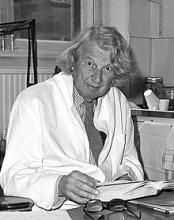John Zachary Young was born in Bristol on 18 March 1907 to Constance and Philip Young, an engineer. John was schooled at home until the age of nine, when he was sent to a boarding school in Worcestershire. At thirteen he attended Marlborough College. In 1925 he entered Magdalen College, Oxford where he studied zoology and achieved a first in 1928.
Young remained at Oxford, holding various college and university posts. In 1943 he became Vice-President of Magdalen College. During World War II he served as leader of the Medical Research Council, in which post he investigated nerve injuries. In 1945 he left Oxford and took up an appointment as professor of human anatomy at University College London. His appointment was controversial, however, since he lacked the medical qualifications that past holders of the position had possessed without exception. Criticisms were soon put to rest, and he remained there until his retirement in 1974. In retirement, he kept busy at the Wellcome Foundation and the psychology department in Oxford.
One of Young’s major achievements as a scientist was in his work investigating the cellular mechanisms of memory through experiments on octopuses. Using surgical experiments, he shed light upon both the operations of short- and long-term memory in their central nervous systems and the ways in which they reacted to and processed visual and tactile stimuli. Young’s work left at lasting impression on his field, although his findings left even more complex questions concerning the problem of memory than those it answered.
Over the course of his carerr, Young did not restrict himself to a single field of study. He invested a considerable degree of enthusiasm and energy into teaching zoology to students at Oxford and London and wrote what are considered to be classic textbooks: The Life of Vertebrates (1950) and The Life of Mammals (1957). His dislike for borders and tradition led him to research in other fields than zoology, most notably in philosophy and ethics. His Gifford Lectures ‘Programs of the Brain’ present the some of the philosophical fruits of his scientific labour, in which he characterises the brain as a computer that relies on both a neurological and an evolutionary memory.
Young was awarded many honours in his lifetime, including eight honorary degrees and fellowships of the Royal Society and the British Academy. In 1991 he was granted honorary citizenship of Naples.
On 4 July 1997 Young suffered from heart failure and passed away in Oxford. He left three children from two marriages.
His works include The Life of Vertebrates (1950), The Life of Mammals (1957), Introduction to the Study of Man (1971), Programs of the Brain (1978) and Philosophy and the Brain (1987).



